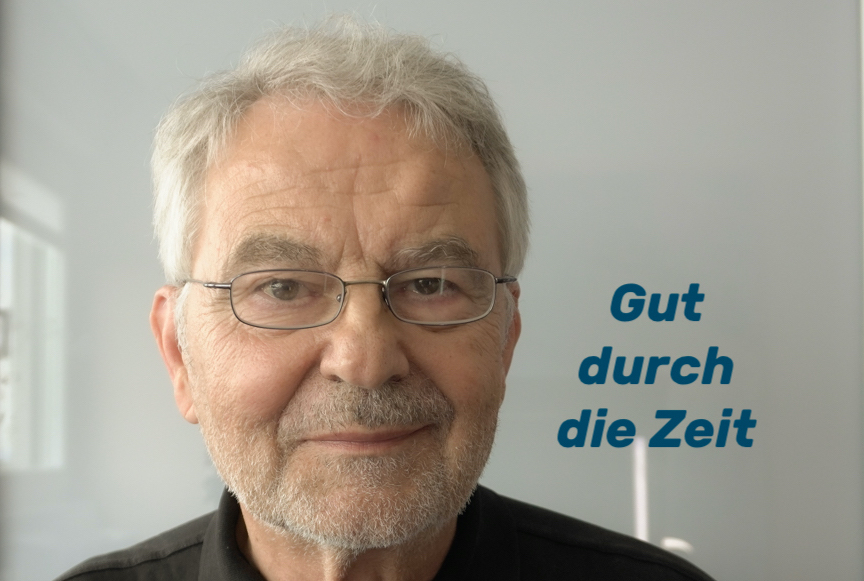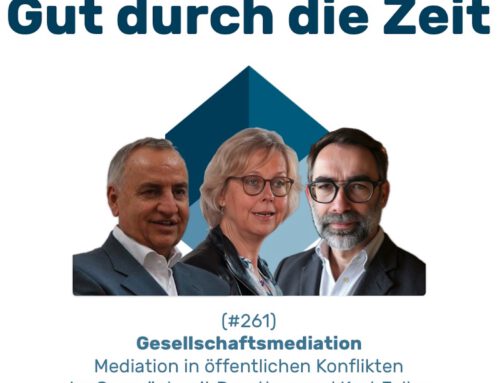INKOVEMA Podcast „Well through time“
#44 – Dilemmas in organisational consulting.
Anyone who thinks a dilemma is a problem really has a problem. In conversation with Rolf Balling
Well through time. The podcast about mediation, conflict coaching and organisational consulting.
Rolf Ballingorganisational consultant and transaction analyst, explains the problem of dealing with dilemmas – and points out right at the beginning that dilemmas are not problems. And that is by no means the only peculiarity that finds its way into the conversation with Sascha Weigel this time.
Contents:
(Extract from: Balling, Rolf: Dilemmata in der Mediation, in: Theorie und Praxis der Transaktionsanalyse in der Mediation, Ein Handbuch, Nomos-Verlag, 656 p., 2014)
Definitions and fundamental considerations on the dilemma
- A dilemma is a decision situation in which the consequences of all known alternative courses of action are experienced as unsatisfactory/unacceptable.
- In typical Western thinking, dilemmas are quickly seen as something embarrassing. As something that, with good organisation and planning, and of course with a clear mind, script freedom and decision-making power, should not occur at all. Ever since Aristotle, we have liked to think in terms of 'either-or' and hope that this will enable us to make transparent and ultimately comprehensible and convincing decisions in difficult decision-making situations. However, since Gödel-Escher-Bach at the latest, we have known that even logically correct thinking produces contradictions and dilemmas. Eastern thinking tends to go in the 'both-and' direction; the yin-yang symbol for the opposite in the opposite is a well-known expression for this. This is precisely how dilemmas arise, but here the permission to react to them with pragmatic decisions is greater.
- Dilemmas can make us humble. They lead us into search processes, to our limits; and they often give us the opportunity to review and expand our 'frame of reference', our view of the world. This happens when we realise that we have constructed a dilemma ourselves with beliefs that do not fit together.
- Another psychological aspect is often evident in supervision sessions in which 'dilemmas' are presented that do not entail any 'unacceptable' alternatives that are comprehensible to the supervisor. Here, devaluation and grandiosity (according to Schiff's concept of passivity) often serve to unconsciously construct dilemma dramas in order to justify remaining passive - in the face of an unpalatable problem-solving consequence.
- If we succeed in removing the grandiosity and also the dysfunctional beliefs with which many presented dilemmas are charged, a hard core of dilemma often remains, which can also be described as aporia. What remains is the situational impossibility of doing justice to two values and/or goals that are important to us, simultaneously and without compromise.
- Seen in this light, personal dilemma competence is a good indicator of the degree of human maturity achieved. Fundamentalism of any kind can be seen as a refusal to expose oneself to dilemmas. One then produces a trivialising world view that allows one to take one side of a dilemma and exclude and fight the other side.
- Dilemmas are like a black hole or like the Minotaur in the labyrinth of Crete. They can catch us and suck us in. It is therefore advisable to keep your distance and to keep your distance when approaching them in circles. I will also adopt a circular style when dealing with this topic. May this result in helpful perspectives and insights.
- Real dilemmas can therefore not be solved permanently. Sometimes the polarities of a dilemma can be merged at a higher level, but even then the poles remain at the lower level. It is comforting to say that recognising the merging of polarities at a higher level at least makes it easier to make good decisions at the lower level. I don't want to use the word 'solution' in connection with dilemmas at all, but only in connection with 'problems' where it is actually possible to resolve them sustainably.
Examples and typical questions
Classic dilemma situations
a. Dilemmas with two equally good alternatives.
The classic example of this is Buridan's donkey-two-haystacks dilemma, in which a donkey starves to death because it is standing between two equally large and equally distant haystacks, which renders our donkey incapable of action.
A modern example of this could be: Someone has two equally interesting job offers. And he can't decide in favour of one, partly for fear that his choice might turn out to be wrong.
The question would then be:
- Could he forgive himself afterwards? (script level)
- Would there even be anything to forgive? (Existential level)
- Could we ever know that? (Epistemological level)
b. Dilemmas with two unacceptable consequences
Someone wants to preserve their inherited wealth in honour of their parents. But with 'safe' investments in government bonds, inflation is higher than the interest rate; however, an inflation-compensating interest rate is only available with a considerably higher risk, which prevents him from sleeping at night. Here you need a well thought-out and emotionally acceptable compromise that just about ensures a good night's sleep and that you can live with - until the next review of the dilemma situation.
Structures and processes of an organisation as dilemma staging
Organisations see themselves in a technocratic paradigm, as well-constructed machines that would function smoothly … if people weren't constantly causing problems.
In fact, every organisation has to deal with many system-immanent dilemmas that are by no means brought in by people. Dealing with these dilemmas in a strictly technocratic-mechanical paradigm leads to suboptimal decisions because the world is trivialised and adapted to the paradigm.
It is precisely human dilemma competence, not technocratic calculation, that allows organisations to create good decisions in their original dilemmas. Examples of organisational dilemmas are
- Standardised and therefore cost-effective products (says production) versus A wealth of variants to meet customer requirements, which is more expensive (says the sales department)
- A flat hierarchy with few separating levels between the Management Board and employees versus a smaller management span in which the boss really has time for his people.
- Investing in many future technologies to have many irons in the fire of an uncertain future versus Technological leadership in a future technology, with the risk that another technology will prevail after all.
A functional structure/process organisation stages its relevant organisational dilemmas in its structural-social space by means of a corresponding structural organisation. The advantages of such an approach are
- The dilemmas are thus depersonalised and de-tabooed,
- Monitoring the dispute between the poles and the quality of the negotiation results becomes easier,
- If the ranking of the most important dilemmas changes, the organisation can be restructured accordingly. (e.g. in a globalisation process, the dilemma 'headquarters versus regions' should be appropriately staged in the structural and process organisation).
In order for dilemma stagings to produce good results in organisations, they need to continue:
- An appropriate balance of power between the representatives of the polarities,
- Defined escalation processes when the dispute comes to a head,
- a culture in which it is possible to argue without slipping into trench warfare between functional areas,
- a culture in which dilemmas are seen as normal and which enables pragmatic solutions based on loyalty to the greater whole,
- People in organisational roles who can meet this requirement in terms of personal maturity, training and experience.
Fritz Simon sees the possibility of staging dilemmas as a major advantage that an organisation has over an individual person who has to deal with their dilemmas intrapsychically - differentiated into two halves of the chest at best.
There are also culturally constructed dilemmas in organisations that are based on dysfunctional beliefs. One of these is the 'win-win' principle in negotiations if it is absolutised. What happens if there is actually no other option than for one of the negotiating parties to become the 'loser' and there is no real way of compensating for their loss? This is where it sometimes becomes necessary to dispel an unrealistic win-win belief in order to regain the ability to act.
Counselling strategies for dealing with dilemmas
- The permission to see and feel oneself in a dilemma
- Going along with the ambivalences
- Common suffering in identical or different dilemmas
- Dealing with secret and unconscious loyalties
- Bringing the dilemma into the social space
- The framing of search processes with those involved in the dilemma
- Escalation in the context of clarifying dilemmas
- The function of feared error with remorse and/or shame
- Building dilemma competence as a person and role holder in organisations
Left:
- Rolf Balling's website: https://www.rolf-balling.de/





Leave A Comment